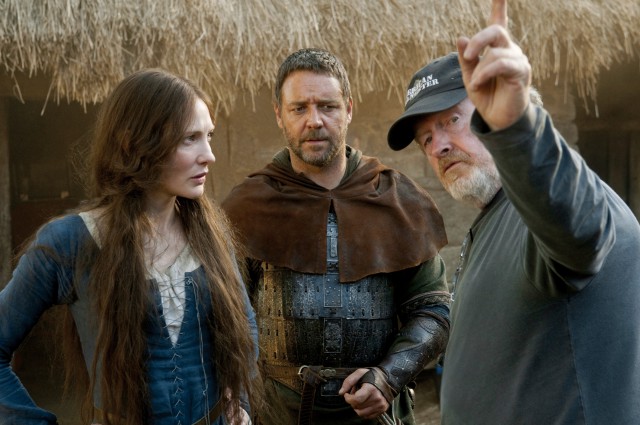
For all of its 12th century trappings, Helgeland and director
contemporary. Rather than a steal-from-the rich yeoman, the film’s
titular hero is a disillusioned war veteran just back from a distant,
violent campaign against Muslims. “We wanted to tell the story of how
the myth was created,” says producer Brian Grazer.
Hood’s homeland is ruled by a king with little
concern for his subjects, and somebody — maybe that guy who’s so good
with bows and arrows? — needs to step up and take the country back.
“There’s a very strong destiny story in this,” says Scott, who shot
most of the film on British locations, including
Hood and his merry men are far less interested in redistributing the wealth than in making sure
Knight’s Tale.” “He is trying to give the people a voice.”
But don’t expect Scott, whose “Gladiator” turned
Crowe into a global, Oscar-winning star, to focus on shuttle diplomacy.
The movie is filled with fighting, including a reverse D-Day landing by
the French on
shores that casts Hood as a battlefield strategist in the mold of
Eisenhower. “The biggest challenge,” Scott says of some of the film’s
inventions, “is how can we be original? Because if you don’t, it
becomes cliche.”
Even with so many horses and quivers and lances,
“Robin Hood” also aims to have something for women. And that’s where
Maid Marian (
been killed and she might need someone to help around the house — maybe
that guy who’s so good with bows and arrows? “You have to remember,”
Scott says, “that you have to be romantic.”
“Robin Hood” had any number of starts and stops —
once delayed by a screenwriters’ strike, and star Crowe, who had just
played a portly journalist in “State of Play,” needed to get into
fighting shape for his starring role. Originally set for release last
November, “Robin Hood” will now premiere
Helgeland says he came onto the movie when Scott was looking for revisions to a screenplay by
(the film’s original title was “Nottingham”) and less focused on Robin
Longstride, as Crowe’s character is called in the finished film.
(Played by “Price & Prejudice’s”
Helgeland had written a script about Cortez called “The Serpent and the Eagle,” with
“Ridley really liked it, but wasn’t ultimately
interested in directing it,” Helgeland says of his Cortez screenplay.
Specifically, Scott admired how Helgeland had taken a historical figure
and brought him to life; he wanted Helgeland to do the same in “
“There’s a legendary DNA about
challenge, he says, was to reinvent the character — and who better to
do that than Crowe, Scott’s star in “Gladiator,” “A
“He likes to do accents,” Scott says of his frequent
collaborator. “He likes to put on weight. He likes to lose weight. And
I kind of like that passion.”
———
(c) 2010, Los Angeles Times.
Visit the Los Angeles Times on the Internet at http://www.latimes.com/
Distributed by McClatchy-Tribune Information Services.














